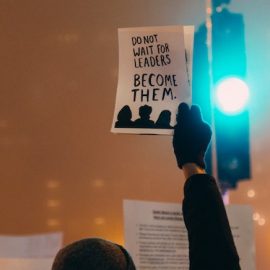

This article is an excerpt from the Shortform book guide to "Do Nothing" by Celeste Headlee. Shortform has the world's best summaries and analyses of books you should be reading.
Like this article? Sign up for a free trial here.
Is hard work a virtue? Is wealth a sign that someone’s a good person?
American culture places a high value on hard work and productivity. This is a problem, according to radio journalist Celeste Headlee. In her book Do Nothing, she discusses where this value comes from.
Read more to learn how America’s work ethic has been shaped over time.
America’s Work Ethic
Headlee says that the American elite exerted cultural pressure on people to work more by promoting the Protestant idea that hard work is virtuous as well as the narrative of the American dream—the idea that you can rise through the ranks and get rich if you work hard enough. The Protestant church had been teaching that hard work is a virtue in the eyes of God (while idleness is a sin) since the 1500s. Then, a 1904 book by the German sociologist Max Weber contributed to America’s work ethic, inspiring capitalists to revive the idea in American culture to get people to willingly work longer hours.
In the book—The Protestant Ethic and the Spirit of Capitalism—Weber argued that linking morality to work was what fueled the booming capitalist economy in Europe in the industrial era. Thus, upper-class Americans decided to use this tenet for their own financial gain, as well. For example, Headlee suggests that, in 1901, a prominent Episcopal leader received millions of dollars in donations from the financier J. P. Morgan to preach that wealth demonstrates that a person has good character (thereby encouraging people to work harder so upper-class employers could make more money).
| The Debate on Weber’s Theory of the Protestant Ethic Although there’s a consensus that Weber’s book was highly influential, some critics disagree with his idea that the Protestant ethic drove capitalism in Europe and the US. For example, some scholars contend that Weber misinterpreted the Protestant doctrine, which encouraged spiritual works (like prayer, for example) and not just any work. They also point out that some Protestant leaders, such as John Calvin, preached against elements of capitalism like accumulating wealth. Others argue that since capitalism first flourished in commercial hubs in Italy, which were primarily Catholic, it was capitalism that influenced Protestantism, and not the other way around. In terms of the tangible effects of Weber’s book, it’s difficult to find examples of how capitalists used the theory to their advantage since many sources focus on the legacy of the book within academia rather than an analysis of its real-world consequences. Likewise, while there are sources that corroborate J.P. Morgan’s financial contributions to the Episcopal Bishop William Lawrence, it’s difficult to prove whether Morgan made the donation for nefarious purposes, as Headlee suggests. |
According to Headlee, employers also made people feel ashamed for taking time off or being idle and convinced laborers to work more by espousing stories of the “self-made man” and the idea of the American dream, in which people could become rich and improve their quality of life through hard work alone. Employers used propaganda such as posters and slogans to link hard work with morality, patriotism, and economic success—a technique that first became popular during World War I.
One example of this is a series of posters called the Mather Work Incentive Posters, which said things like, “Floaters Always Float Down Stream. The worker who drifts from one job to another, is always headed down-and-out. To get up and on, requires real effort, real work. The good places are all up stream.”
(Shortform note: Some historians write that this kind of media, targeted at encouraging hourly laborers to work harder, segued into a new fad in motivational work posters aimed more at managers. This trend coincides with a shift from an industrial-age emphasis on manufacturing to an information-age emphasis on creative work and information technology. Employers may have shifted to focusing on managers because it became important to have leaders coordinating efforts and facilitating large projects rather than having each worker do an individual task as efficiently as possible. Despite this distinction, the underlying goal of the materials still seems to be to encourage ideal traits and behaviors in employees, including hard work.)
Headlee writes that, in addition to using posters and slogans to encourage work, business owners had to figure out how to sell all the new products that workers were helping to make, so the marketing industry put additional pressure on people to make more money and keep up with consumer trends by buying new products.
(Shortform note: In User Friendly, Cliff Kuang and Robert Fabricant write that the feminist movement of the 1920s led to a natural increase in product demand, as more women wanted new household products like vacuum cleaners that would reduce the time they had to spend doing domestic labor. However, in the 1930s, during the Great Depression, marketers had to exert more pressure on people to buy non-essential products.)

———End of Preview———
Like what you just read? Read the rest of the world's best book summary and analysis of Celeste Headlee's "Do Nothing" at Shortform.
Here's what you'll find in our full Do Nothing summary:
- How our fast-paced world is causing us to work less efficiently
- How the culture of overworking has led to social isolation and poor health
- How to embrace true leisure to live a happier and healthier life






